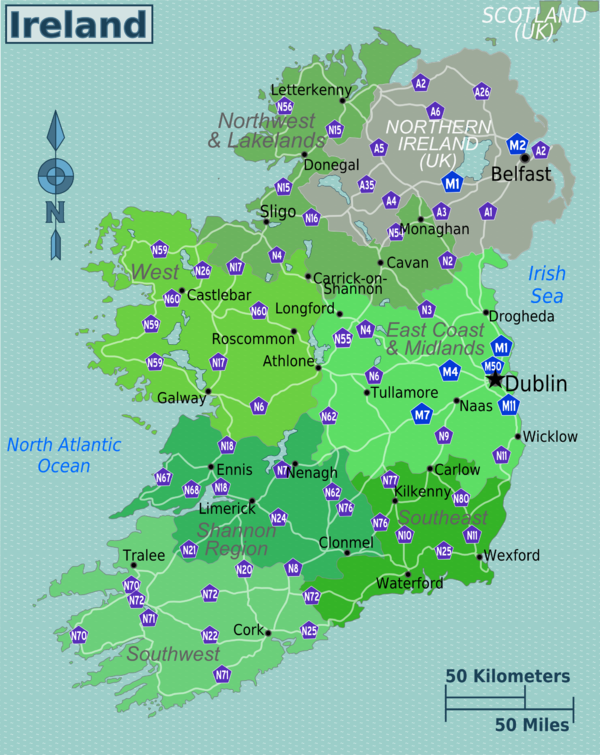Letter to the Editor:
On Sinn Féin and the Irish Language Act
Editor:
Kjirsten Whitsell’s assertion in her article “Northern Ireland: Past and Present Politics” that “Sinn Féin wants to pass an Irish Language Act that enforces the people to learn the Irish language”is patently false. No one has any intention to force anyone to learn or speak the Irish language.
Furthermore, the movement for an Irish Language Act in the North of Ireland, led mostly by young people, is not the sole possession of Sinn Féin. Indeed, four other political parties have official stated support for an Irish Language Act: the Social Democratic and Labour Party (SDLP), the Alliance Party, People Before Profit and the Green Party of Nothern Ireland.
The issue is one of equality.
The historical and continued suppression of the Irish language in Ireland is epitomized by the British Administration of Justice (Language) Act of 1737, which was upheld by Lord Justice Girvan in 2010.
This onerous legislation, which bans the use of the Irish language in courts, has been described by Irish historian Dr. Éamon Phoenix as “the cultural equivalent of the penal laws”.
This residual Penal Law remains in force in the North of a partitioned Ireland in spite of the stipulations of the 1998 Good Friday Agreement for “parity of esteem” and the specific call for an Irish Language Act in the Saint Andrews Agreement of 2006.
There already is a Scottish Gaelic Language Act for Scotland, just as there is a Welsh Language Act for Wales.
Prior to these Agreements, the Democratic Unionist Party (“DUP”) had exhibited its anti-Gaelic bias most dramatically in the Belfast City Council by physically ejecting then-Counsellor Máirtín Ó Muilleoir from the Council Chambers for daring to address his colleagues in the language which gave Béal Feirste its name. It was at this time that the DUP’s Sammy Wilson called Irish a “leprechaun language” and Rhonda Paisley, daughter of DUP founder Rev’d Ian Paisley, asserted that the Irish language “drips with their blood-thirsty saliva”.
Up until this present day, no Irish Language Act has been introduced and the DUP has shown little to no improvement in their toxic attitude and bigotry toward the Irish language.
In 2014, DUP MLA Gregory Campbell stunned his colleagues on the very floor of the Stormont Assembly with the puerile “Curry my yoghurt, can coca coalyer”, a lame parody of “Go raibh maith agat, a Cheann Comhairle” (“Thank you, speaker.”)
In December of 2016, on the heels of his own party’s £500 million Renewable Heat Incentive scandal, DUP Communities Minister Paul Givan axed a £50,000 Líofa bursary that enabled disadvantaged youth to study Irish in the Gaeltacht for the summer. This was restored only after significant public outcry.
Rather that show real outreach and leadership, DUP leader Arlene Foster dehumanized Irish speakers in her comment about “feeding crocodiles” last February.
In April of 2017, four Irish language youth groups were denied funds and forced to close.
Not content with reptilian references and denying public funds, the West Belfast DUP published rather unnerving threats against young Irish speakers on Facebook. The DUP still has not addressed it nor has Facebook deleted the page.
On May 20th, 15000 people, many of them Irish-speaking youth, took part in a Lá Dearg (“Red Day”) march through the streets of Belfast in support of an Irish Language Act.
In spite of Arlene Foster’s seemingly cosmetic visits with Irish language groups, no concrete commitment in favor of the Irish language has come from the political party which takes it upon themselves to decide which individuals and groups “truly love the Irish language” and now is poised to enter into the government of a world superpower, a permanent member of the UN Security Council and close ally of the United States.
Hopes were raised over the weekend prior to last Saint Valentine’s Day, February 14th. On that day, Irish Taoiseach Leo Varadkar and British Prime Minister Theresa May arrived at Belfast’s Stormont Castle for a seeming settlement, which purportedly included a stand-alone Irish Language Act, a separate Ulster Scots Language Act and a third Act addressing culture.
However, as Irish News Political Correspondent John Manley wrote, “Arlene Foster has been spooked” by the prospect of “tribal antagonism” and that in the year 2018.
Weeks later, the publication published Allison Morris’ stunning exposé, revealing that the DUP consulted with terrorist paramilitaries, the Ulster Defense Association (“UDA”) and the Ulster Volunteer Force (“UVF”) on the language issue.
Given our own Country’s diplomatic, political and even financial investment in the Irish Peace Process, and now particularly with the advent of a new United States Special Envoy, the vital issue of Irish language rights is a concern to us all.
Is mise,
Daithí Mac Lochlainn
Rúnaí (Secretary)
Cumann Cháitlín agus Thomáis Uí Chléirigh
Brooklyn Branch of Conradh na Gaeilge (The Gaelic League)
Brooklyn, New York



